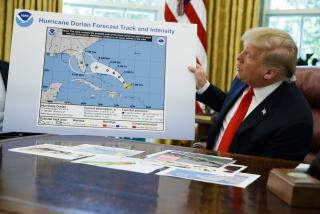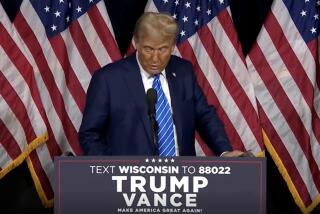Op-Ed: Are Trump’s coronavirus failures Ronald Reagan’s fault?
Donald Trump’s handling of the coronavirus crisis has been deeply flawed. The administration’s pandemic faults are vast and varied, and the president should be held accountable for them. But so should the Republican Party: In many ways, the author of the Trump administration’s COVID-19 fiasco is the man who remade the party in the 1980s, Ronald Reagan.
At every stage of the COVID-19 challenge, Trump has failed to mobilize the federal government effectively. The Centers for Disease Control and Prevention has been ill-prepared or blocked from coordinating a national response that matches the crisis. Experts, especially scientists, have been sidelined. Despite Congress authorizing trillions in stimulus and relief aid, the actual management of those programs has been slipshod and haphazard. And the number of cases just keeps rising, ominously.
Trump’s lack of leadership reflects an agenda that takes its cues from an idealized President Reagan. From the start of his presidency, Reagan trumpeted a rejection of using government to help the country, to act as a partner in solving its problems. In his first inaugural address in 1981, Reagan declared, “Government is not the solution to our problem; government is the problem.” In his second term, during a news conference in August 1986, he phrased the issue in even starker terms: “The nine most terrifying words in the English language are: I’m from the government, and I’m here to help.”
Is it any surprise that, today, a Republican Party that is spiritual heir to Reagan would be ineffective in using a tool its most revered recent president disowned? “While the economic pain is nowhere close to ending,” reported the New York Times in May, “Republicans seem disinclined to renew huge spending programs, particularly as November looms.” Said top presidential advisor Stephen Moore: “All government can do right now is make things worse, not better.” Sound familiar?
In particular, Reagan’s legacy has hamstrung Republican support for a strong scientific response to COVID-19. Richard Nixon bonded the GOP with Southern conservatives in the late 1960s over race, then Reagan moved this alliance in a new direction by courting the often anti-science religious far right.
“In Mr. Reagan,” said one news article, fundamentalist Christians “had a president who shared their distaste for modern whirls of social change. His endorsement of them was a clarion call. ‘It was, like, come up out of the catacombs — you know, you don’t have to be silent anymore,’ the conservative columnist Cal Thomas said.”
At the 1980 Republican convention that nominated Reagan, “the pew trumped the country club,” wrote Steven P. Miller in “The Age of Evangelicalism.” An attendee marveled that the GOP’s public policy declarations were “right down the line an evangelical platform.”
Religious fundamentalism of all kinds disputes science. A friend I grew up with in New York City remembered his apostasy in second grade: “ I asked Rabbi Fuchs how the world could be only 5,000 years old when I was seeing dinosaurs that were millions of years old in the museum. His reply is still with me today: ‘Those are fakes put there by goyim to fool the Jews.’ Boom! I was re-created as an agnostic.”
Yet science remains the key to beating the coronavirus; rejecting its guidance is dangerous, if not suicidal. When Reagan forged the GOP’s connection to the most anti-science branch of Christianity, he laid the groundwork for the Trump administration’s response to pandemic.
In 2013, then-Louisiana Gov. Bobby Jindal told Republicans, “We must stop being the stupid party.” He called out candidates’ “offensive and bizarre comments” in the 2012 campaign (remember Missouri Rep. Todd Akin’s assertion that if a woman were the victim of “legitimate rape,” her body would prevent her from getting pregnant?).
Jindal’s plea wasn’t heeded. Reagan’s culture war allies had too tight a hold on party doctrine to let light seep in.
And now we face a medical and public health crisis that is only growing in its seriousness. Reagan too confronted a challenge of this nature. Through 1989, the year he left office, almost 90,000 Americans had died from AIDS. HIV infection amounted to an epidemic of historic proportions, yet the administration’s response to the “gay cancer” was halting and negligible.
A student of mine investigated Reagan’s AIDS response for her senior history thesis. Wasn’t it unlikely that a longtime Hollywood actor, working in a business with a well-documented gay cohort, would be so homophobic as to ignore the HIV public health scourge? What she found — in personal documents, third-party reports and policy records — was that Reagan showed little animus toward the LGBT community but made a cold political calculation to play to his base.
Donald Trump has used dog-whistle language to call for churches to reopen and to make face coverings a partisan issue. Last week, he addressed student supporters — seated close together and not wearing masks — at a Phoenix church. This week, Vice President Mike Pence, at the First Baptist Church in Dallas, an evangelical stronghold, watched approvingly as a 100-person choir sang maskless.
Nothing exists in a vacuum. The roots of Trump’s disastrous handling of America’s coronavirus scourge were planted in the 1980s by Ronald Reagan.
Robert A. Slayton is a professor of history at Chapman University.
More to Read
A cure for the common opinion
Get thought-provoking perspectives with our weekly newsletter.
You may occasionally receive promotional content from the Los Angeles Times.










